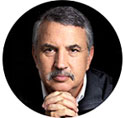Say It Like It Is: When You Don’t Call Things By Their Real Name, You Always Get In Trouble

By Thomas L. Friedman
Jan. 20, 2015
I’ve never been a fan of global conferences to solve problems, but when I read that the Obama administration is organizing a Summit on Countering Violent Extremism for Feb. 18, in response to the Paris killings, I had a visceral reaction: Is there a box on my tax returns that I can check so my tax dollars won’t go to pay for this?
When you don’t call things by their real name, you always get in trouble. And this administration, so fearful of being accused of Islamophobia, is refusing to make any link to radical Islam from the recent explosions of violence against civilians (most of them Muslims) by Boko Haram in Nigeria, by the Taliban in Pakistan, by Al Qaeda in Paris and by jihadists in Yemen and Iraq. We’ve entered the theatre of the absurd.
Last week the conservative columnist Rich Lowry wrote an essay in Politico Magazine that contained quotes from White House spokesman Josh Earnest that I could not believe. I was sure they were made up. But I checked the transcript: 100 percent correct. I can’t say it better than Lowry did:
“The administration has lapsed into unselfconscious ridiculousness. Asked why the administration won’t say [after the Paris attacks] we are at war with radical Islam, Earnest on Tuesday explained the administration’s first concern ‘is accuracy. We want to describe exactly what happened. These are individuals who carried out an act of terrorism, and they later tried to justify that act of terrorism by invoking the religion of Islam and their own deviant view of it.’
This makes it sound as if the Charlie Hebdo terrorists set out to commit a random act of violent extremism and only subsequently, when they realized that they needed some justification, did they reach for Islam.
The day before, Earnest had conceded that there are lists of recent ‘examples of individuals who have cited Islam as they’ve carried out acts of violence.’ Cited Islam? According to the Earnest theory ... purposeless violent extremists rummage through the scriptures of great faiths, looking for some verses to cite to support their mayhem and often happen to settle on the holy texts of Islam.”
President Obama knows better. I am all for restraint on the issue, and would never hold every Muslim accountable for the acts of a few. But it is not good for us or the Muslim world to pretend that this spreading jihadist violence isn’t coming out of their faith community. It is coming mostly, but not exclusively, from angry young men and preachers on the fringe of the Sunni Arab and Pakistani communities in the Middle East and Europe.
If Western interventions help foster violent Islamic reactions, we should reduce them. To the extent that Muslim immigrants in European countries feel marginalized, they and their hosts should worker harder on absorption. But both efforts will only take you so far.
Something else is also at work, and it needs to be discussed. It is the struggle within Arab and Pakistani Sunni Islam over whether and how to embrace modernity, pluralism and women’s rights. That struggle drives, and is driven by, the dysfunctionality of so many Arab states and Pakistan. It has left these societies with too many young men who have never held a job or a girl’s hand, who then seek to overcome their humiliation at being left behind, and to find identity, by “purifying” their worlds of other Muslims who are not sufficiently pious and of Westerners whom they perceive to be putting Muslims down. But you don’t see this in the two giant Muslim communities in Indonesia or India. Only Sunni Arabs and Pakistanis can get inside their narrative and remediate it. But reformers can only do that if they have a free, secure political space. If we’re not going to help create space for that internal dialogue, let’s just be quiet. Don’t say stupid stuff. And don’t hold airy fairy conferences that dodge the real issues, which many mainstream Muslims know and are actually starved to discuss, especially women.
The Arab journalist Diana Moukalled, writing in the London-based Asharq Al-Awsat last week, asked: “Don’t all these events now going on around us and committed in our name require us to break the fear barrier and begin to question our region and our societies, especially the ideas being trafficked there that have led us to this awful stage where we are tearing at one another’s throats — to mention nothing of what as a result also happens beyond our region?”
And a remarkable piece in The Washington Post Sunday by Asra Q. Nomani, an American Muslim born in India, called out the “honour corps” — a loose, well-funded coalition of governments and private individuals “that tries to silence debate on extremist ideology in order to protect the image of Islam.” It “throws the label of ‘Islamophobe’ on pundits, journalists and others who dare to talk about extremist ideology in the religion. ... The official and unofficial channels work in tandem, harassing, threatening and battling introspective Muslims and non-Muslims everywhere. ... The bullying often works to silence critics of Islamic extremism. ... They cause governments, writers and experts to walk on eggshells.”
I know one in particular.
Source: http://www.nytimes.com/2015/01/21/opinion/thomas-friedman-say-it-like-it-is.html?_r=0




 Moderate Islamist here
Moderate Islamist here


0 comments:
Post a Comment